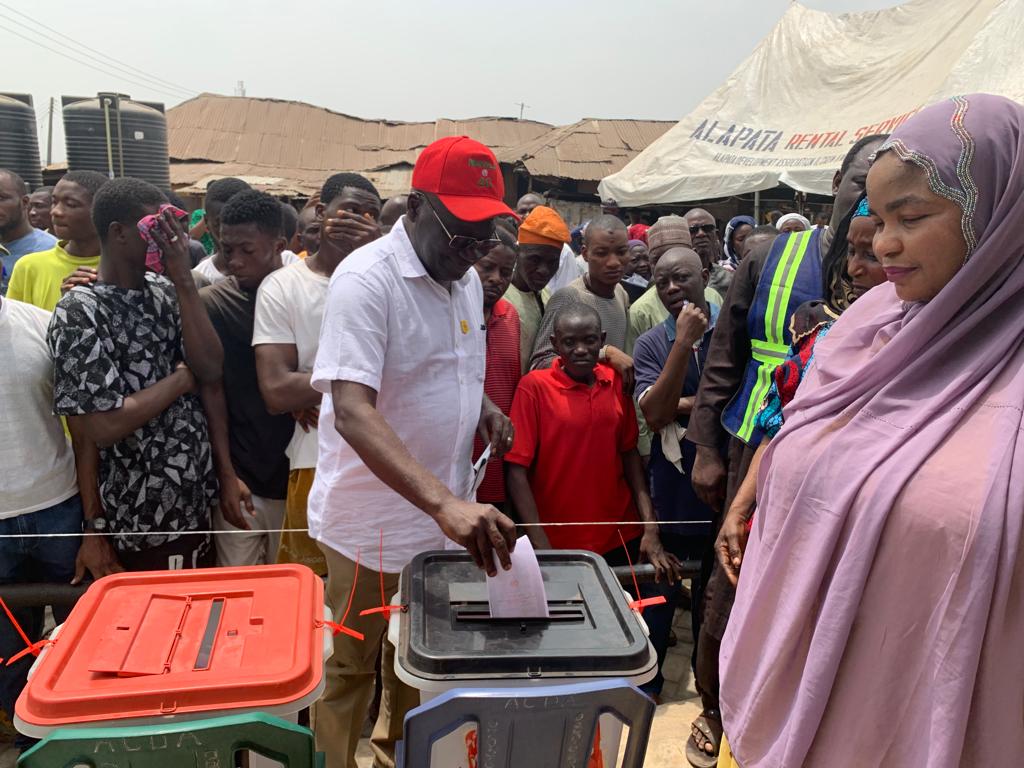By Abubakar Imam
Every community, no matter how small or big; simple or complex, sophisticated or antiquated, modern or rustic, is usually blessed with individuals who are extraordinary or phenomenal.They are those described as larger than life.
This class of individuals did what others never attempted or offered certain services in unique manners; clearly unanticipated neither by their predecessors nor contemporaries. A quality which often make them subjects of emulation and veneration among the succeeding generations of their societies.
The spectacular achievements of such heroic figures may be rooted in their supernatural prowess as it was typical of the pre-historic era. It could be due to extra-ordinary intellectual sophistication or uncommon dedication. It could be as a result of unusual political sagacity, administrative wizardry or audacious gallantry. It could even be rooted in phenomenal generosity or prolific creativity.
The two centuries old Ilorin Emirate has never lacked such extra-ordinary figures whose varied accomplishments accounted for what the community is in every aspect today.
Among those distinguished indigenes of Ilorin,whose conduct, capabilities,dispositions and accomplishments earn favourable place in the “Hall of Fame” of the nation’s”most peculiar” Emirate is Alfa AbdulRahman Pakata, the pioneer ‘Oba Oniwaka’ or Chief Poet of Ilorin.
AbdulRahman Pakata (otherwise known as Pakutu-Pakata); was an eminent cultural icon of Ilorin who devoted his entire life and career to the peace,growth and development of the community using ‘Waka’ poem as an instrument.
PARENTAGE $ BIRTH:
Just like most of his predecessors and contemporaries, the exact date of birth of this outstanding patriot was not recorded.And if recorded, the record has not survived the poor culture of preservation of written materials peculiar to that era.
This is because the Ilorin of that period was noted for its high Arabic literary productivity as seen in the profuse literary documentation on issues, events and personalities,some of which survived till date.
Oral accounts, however, suggest that Alfa AbdulRahman was born around 1860. His father was Alfa Adam,one of the children of Abudu Lateju (Abdullahi Olateju); who was the first Magaji Abudu of Ilorin. Alfa Adam himself relocated to Pakata from ‘Ile Abudu’ near the Emir’s Palace upon the death of his own father, whose life came to an abrupt end as a result of the terrible defeat Ilorin suffered during a battle in the course of a War at Osogbo/Ikirun axis around 1840.
One of the main outcomes of the war was the execution of some pioneer patriots, soldiers and leaders of Ilorin with noble ancestry, who were captured in the battlefront as prisoners of war. One of them was Lateju; a Comrade-in-arm to Usman, the first Balogun Ajikobi of Ilorin. Together, the duo were sentenced to capital punishment for refusing to betray the cause of Ilorin in favour of Oyo/Yoruba hegemony.
They were well-regarded eminent Yoruba statesmen before migrating to Ilorin along with Sheik Alimi; the celebrated Founder of modern Ilorin.
Alfa AbdulRahman’s illustrious father was the founder of Agors’ Compound, the host family of the remnant of the ancient Pakata Market near the famous Pakata Roundabout. His mother was said to be a daughter of the Onikeke family of Alore, to which the famous Horse-Rider of the 1940s Ilorin; Olorunmoko belonged.
EDUCATION $ TRAINING
Alfa AbdulRahaman grew-up under the guidance of his father who also taught him to read, memorise and translate the Glorious Quran as well as some other popular Arabic literature of that generation. He was raised as a Quranic teacher who combined Islamic scholarship with farming, hunting and trading of various products to keep the body and the soul together. That is the location of the ancient Pakata Market within the precinct of his homestead afforded.
The young AbdulRahaman used to accompany his father to numerous public preachings of the leading Islamic Scholars of Ilorin of that era. He consequntly turned out to be a precocious child. Abdulrahman, thereafter, developed deep interest in Islamic-cum Yoruba literary compositions otherwise called ‘Waka’; which was and is an indispensable tool in the hands of Yoruba Muslim preachers to succinctly summarize, codify and ensure proper assimilation of “spiritual diets” they often served.
He would commit such songs into memory and thereafter, compose his own to the admiration of his parents, friends, associates and other culturally-conscious contemporaries of his.
CAREER AND FAME
For many years, Alfa AbdulRahman used Waka compositions just to keep himself busy and invariably entertained and educated his contemporaries. He was loved for his intellectual ingenuity and deep understanding of the developments of his time, which he often reflected in his alluring poetic compositions.
However, he never engaged in it as a professional and neither was he known as a poet beyond his immediate environment prior to 15th February, 1897. His subsequent emergence as a great and influential Waka Exponent was paradoxical.
He became well-known following a great tragedy that befell Ilorin. His public career started the day the Emirate lost her independence following it’s subjugation by the British colonialists.
The sack of Ilorin forced the then Emir-Suleiman Ibn Aliyu (1896-1915) to hurriedly leave his palace as he fled to Ogidi with no specific destination in mind, leaving all his royalty and avoiding being captured or killed by the powerful Royal Niger Company.
AbdulRahman’s father, who was one of the leading Mallams and opinion leaders of Ilorin at that time, had warned the then Emir about the impending colonial expansion by the ruthless western imperialists. He was said to have advised the Emir to prevail on his Generals (Baloguns) to suspend expansionist tendencies because it would expose the community to unmatchable enemies.
But since the tragedy was meant to be, the advice was ignored and hence the inevitable sack of Ilorin. However, the British were confused on what to do after crushing the feeble resistance displayed by a hurriedly warranted Ilorin Army since the main Army, led by the then Balogun Gambari, Adamu Kaseta (d.1897), was at the war-front in Ekiti-Land.
Following a thorough analysis of the precarious situation, the invaders decided to rule indirectly through the Emir and hence the invitation extended to Oba Suleiman to come back to his Palace to sign a treaty with the representatives of the British Empire.
On the Emir’s way back, he was said to have had a stop-over at Pakata where he met AbdulRahaman’s father, Alfa Adam; who was already old and physically weak. He(Adam) directed his son, AbdulRahman, and some other youngsters to join the Emir’s entourage back to the Palace.
As a Poet, AbdulRahaman decided not only to use poem to entertain the enervated and humbled Royal party, but to also encourage the Emir and the people of the Emirate to take heart on the unfortunate development with the hope that since no condition was permanent, the Emir would surely regain his power and prestige among his people and neighbours.
That great tragedy, therefore,unveiled Alfa AbdulRahman as a potentially great strategic communicator and subsequently raised him up as a pride of the community whose presence and melodious voice was always sought by the royals, commoners, young and old. And hence, the precipitation of his greatness and immortality.
Sequel to that performance and the regain of titular power by the Emir, AbdulRahaman became a common face in the Palace and elsewhere doing what he knew how to do best.
When Emir Suleiman joined his ancestors, his successor, Oba Shuaib Dan Bawa (1915-1919), the great-grandfather of the present Emir, Alhaji Ibrahim Sulu-Gambari (b.1940), gained the admiration and loyalty of AbdulRahaman and he was the one who subsequently conferred on the poet the title of ‘the Oba Oniwaka of Ilorin’ around 1917, which made him the first to probably hold a non-hereditary professional chieftaincy title in Ilorin.
And upon the demise of Bawa and the appointment of his direct son (AbdulKadir Shuaib Bawa) as his successor in 1919, the first and the only time such happened in the history of Ilorin, there was anger and misgivings among the people about such hitherto unexperienced succession.
AbdulRahaman was among the few who composed poems affirming the awesomeness of Allah in everything and that everyone should, therefore, accept the decision of the incipient colonial administration as the wish of the unquestionable almighty Allah.
As expected AbdulRahman contested with several contemporaries in the field. Those professional rivals, who were also gifted in the art and science of ‘Waka’ employed their “poetic licences” with a view to outsmarting him.
But despite that stiff competition, AbdulRahaman was able to dust the challenges posed by Yahaya Alawuyan, Saliu Apomu and Adamu Kutashi of Omoda through deep and meaningful sarcastic compositions and the uniquely acrobatic display of his energetic horse, which often stupefied his challengers and won him the admiration of all and sundry.
Below stanza is one of his poems that won the admiration of his generation and placed him on a limelight.
While the philosophical tendencies of his compositions were found to be infectious by the elders, the unusual acrobatic gymnastics of his horse, which steps often synchronized with the rhythm of its rider’s songs was found to be compelling and magnetic by the youngsters of that epoch, one of whom was the late pioneer Grand Mufti of Ilorin, Shaykh Mohammad Kamalud-Deen (1905-2005), who recalled that children of Ilorin of AbdulRahaman’s heydays often accompanied him back home from the Ilorin Central Mosque every Friday.
Alfa AbdulRahaman was, thereafter, retained as the Number One Poet of the Emirate by the Emir Abdulkadir Shuaib Dan Bawa, the maternal grandfather of the incumbent Emir, who reigned between 1919 and 1959; and during whose reign the great ‘Waka’ exponent died around 1933 in Ilorin.
It is a matter of historical fact and not an exaggerated tribute to his personality and accomplishments that the shoe of the Chief Poet of Ilorin became so big that upon his death in 1933, no one, not even the cerebral Dodo Agbarere, was found worthy of that office until the nineth Emir of Ilorin and the father to the incumbent, Alhaji Sulu Gambari who reigned between 1959 and 1992 conferred the title on witty Alhaji Ibrahim Alabi Labaeka (1919-2001) in the early 1980s.
The enduring legacy of the subject of this piece is the establishment of a very strong reputation, committed followership and loyal admirers for his genre of oral literature which has been adopted and cherished not only in Ilorin but all-over places inhabited by Yoruba-speaking Muslims till date. He was also a model to other Waka artists who dominated the scene after him such as Dodo Agbarere, Ahmada Kalubi, who took-over the cultural lineage after the death of AbdulRahaman and, of course, Alabi Labaeka among others.
Imam is the Deputy Editor of Unilorin Bullentin and the National Publicity Secretary, Ilorin Emirate Descendants Progressive Union(IEDPU).









